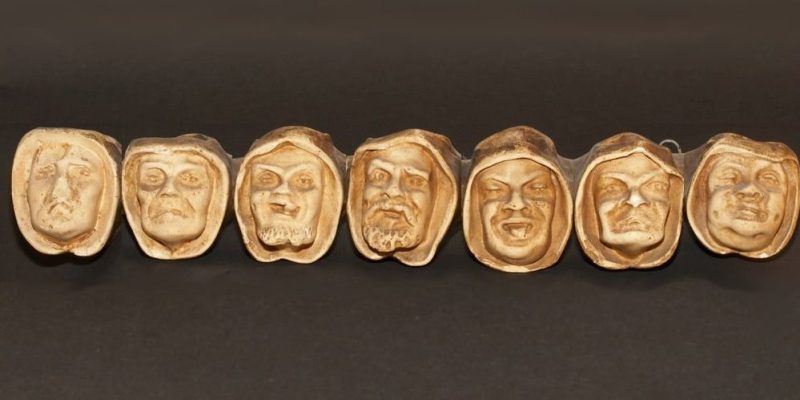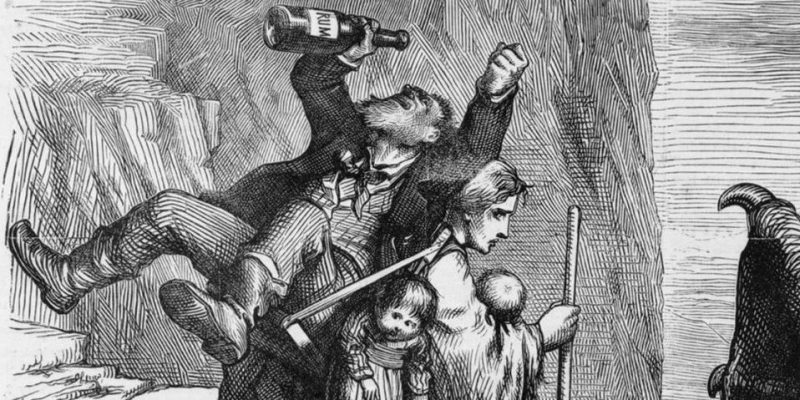We explain what the seven deadly sins are for Christianity, their history and characteristics of each one. Furthermore, the heavenly virtues.

What are the seven deadly sins?
In Christian Catholic theology, they are known as capital sins, cardinal sins or capital vices. the seven primordial human faults or weaknesses, which engender the rest of the possible human sins and which, therefore, are contrary to Christian teachings. The name “capital” comes from Latin capitis (“head”), and refers to the fact that these seven sins are the source of many other possible sins committed by human beings.
The seven deadly sins are: anger, gluttony, pride, lust, laziness, greed and envy. Each was considered a serious sin and associated with a demon and an exemplary animal: anger was associated with Amon and was represented with a lion, gluttony was associated with Beelzebub and was represented with a pig, pride was associated with Lucifer and was represented with a peacock, lust was associated with Asmodeus and was represented with a goat or a rabbit, sloth was associated with Belphegor and was represented with a snail, greed was associated with Mammon and was represented with a toad and Envy was associated with Leviathan and was represented with a snake.
Since the beginning of Catholicism, the deadly sins inspired art and religious literature and were part of sermons, reflections and various illustrations. Today they are part of the popular imagination in the Christian West, and continue to inspire stories and films such as Se7en (1995) by David Fincher or the Italian film classic I sette peccati capitali (1952) in which different directors intervene.
History of the seven deadly sins
The deadly sins have been part of Christian theology since its origins, since many appear condemned in the Old Testament and others have clear antecedents in the Greco-Roman religion. However, The first time they were formally compiled took place in the 4th century AD. C., by the ascetic Evagrius of Nitria who identified eight “bad thoughts.” But it would be his disciple John Cassian in the 5th century who introduced and popularized them in Europe, baptizing them as “the eight main vices” (octo principalibus vitiis).
Subsequently, In the 6th century, Pope Gregory I reviewed the works of these two anchorites and reworked the list of capital sins reducing it to the seven known today. The order of sins on the list, however, has since changed many times, in accordance with later reinterpretations by theologians such as Bonaventure of Fidanza (1218-1274) and Saint Thomas Aquinas (1225-1274), among others.
On the other hand, these fundamental sins structured, according to the vision of the poet Dante Alighieri (1265-1321) in his divine comedy (written between 1308 and 1321), the seven circles or levels that make up hell. This Renaissance vision was the most widespread and known in the modern world.
The seven deadly sins
1. Pride

The pride It is considered the first and main of all capital sins since the arrogant person thinks of himself as much more important than others and their lives and needs, so that he can cause harm and meanness to them without repentance.
This sin can be understood as a form of supreme selfishness and egocentrism, which places the individual in a position of superiority over the rest of the people and leads him to boast about his own. A proud person will not apologize to the person he hurt, considering him inferior to himself, nor will he take into consideration the needs of others, since he is solely focused on himself.
Arrogance, pride and vanity are, for practical purposes, synonyms and appear interchangeably on many lists of deadly sins. In fact, in the Christian imagination it was pride that lost the angel Lucifer, who, rising up against the heavenly order, was expelled from paradise and now reigns in hell.
2. Anger

The anger It is the supreme form of rage and indignation, which acquires aggressive and even violent overtones since the angry individual loses control of himself. Anger pushes individuals to commit actions that they will later regret, such as assault, murder, or simply hurting people who do not deserve it.
Of all the deadly sins, anger is the only one that does not have to do with a corrupt form of love of self and personal interests, although Dante Alighieri defined it as a “love of justice perverted into revenge and resentment.” People overcome by anger act in an intolerant, aggressive or violent manner, which It is contrary to peace and social harmony and contradicts love of neighbor preached by Christianity.
3. Lust

Lust can be defined as a voracious, disordered, insatiable and uncontrollable sexual appetite, which drives people to promiscuity, rape and adultery that is, to put their carnal desires above their own and others' well-being. This is one of the sins most universally condemned by the world's religions.
Lustful people, as Dante Alighieri explained, surrender to a possessive feeling over others, which leads them to love in a disorderly and promiscuous way, thus placing the love of God on a second step. In the hell imagined by Dante in his Divine Comedythe lustful purged their guilt by being dragged eternally from one place to another by an infernal waterspout, that is, by a hurricane wind. This represented the fact that they submit reason to desire.
4. Envy

Envy is, in the words of Dante Alighieri, “the love of one's own goods perverted to the desire to deprive others of theirs.” This means that Envious people desire other people's goods so intensely that they wish misfortunes on others or rejoice when they lose what they were envied.
In this way, envy can be understood as a form of unlimited and egocentric desire, which makes people experience the fact that others have something they want as if it were an injustice or a personal affront, directed at themselves. Envious people, thus, are capable of destroying the happiness of others or ruining the property of third parties because “if they are not for me, they should not belong to anyone.”
According to biblical stories, the first envious person was Cain, son of Adam and Eve, who envied his brother Abel for being God's favorite. This envy led him to ambush and murder his brother.
5. Gluttony

Gluttony can be understood as a form of excessive gluttony, that is, a disordered and insatiable desire to eat and drink, which pushes people towards addiction and waste. Gluttony leads people to consume much more than they really need, that is, to consume for the mere act of consuming and not to sustain themselves. This excessive behavior is condemned by virtually all the world's religions, as are lust and greed.
In the Divine Comedy From Dante, the infernal circle of gluttony subjected penitents to atrocious hunger and thirst, but when they tried to eat the beautiful, fleshy fruits of a tree, the branches withdrew out of their reach; and when they tried to drink the water from the lakes, it escaped through their fingers without them being able to taste it.
On the other hand, drug addictions also fall within the sin of gluttony.
6. Greed

Avarice or greed It consists of the excessive and irrational love for one's own goods, so that their preservation is put before the well-being of oneself and others. Greedy people never feel like they have enough, and they react with anger to the idea that they might lose a little of what they have, or that they might have to give a little to others.
Saint Thomas Aquinas explained this sin as the preference of worldly and ephemeral goods over true divine goods, that is, feeling more love for earthly matters than for God. Thus, the greedy can incur other sins and reprehensible actions, such as betrayal, lying, theft or bribery, since their loyalties are placed solely in material goods (money, above all).
7. Laziness
Laziness or heartburn consists of the lack of willingness to undertake necessary tasks, due to excess comfort or lack of initiative. But we should not confuse laziness with leisure, that is, with the recreation time that we give ourselves once our tasks have been completed. Lazy people are victims of a lack of vitality that leads them to ignore their own and other people's needs, so they let others solve everything.
The lazy violate the divine maxim of “help yourself and I will help you,” and do not make the slightest effort for work, sustenance or solving problems, so that they end up being a burden for their neighbors or for themselves. Furthermore, the “sadness of spirit” of the lazy person distances him from religious discipline and ritual acts that ingratiate him with God, which is interpreted as a feeling of reluctance for eternal salvation.
The seven heavenly virtues
Just as there are seven capital sins in Catholic doctrine, there are seven supreme virtues that counteract them and that make up the duty of every good Christian. These maximum virtues are:
- humility. The counterpart to pride is to remind ourselves that we are not better or more important than anyone else.
- The generosity. The counterpart of greed consists of detachment and altruism, that is, not hesitating to provide one's own to those who need it most.
- chastity. The counterpart of lust, it consists of sexual moderation and pleasures, without necessarily becoming abstinence or celibacy.
- Patience. The counterpart of anger is to tolerate others and endure conflicts and difficulties with good spirits.
- Temperance. The counterpart of gluttony, it consists of the control of one's own will over instincts, temptations and vices.
- charity. The counterpart to envy, it consists of empathy and solidarity with others, without distinguishing between those who have and those who do not, between friend and enemy.
- The diligence. The counterpart of laziness is the commitment to honor responsibilities and commit to necessary tasks, that is, to do them as best as possible and with an active spirit.
Continue with: Types of securities
References
- “Deadly Sins” on Wikipedia.
- “Cardinal virtues” on Wikipedia.
- “What are the 7 deadly sins and what do they mean” in the newspaper Clarín (Argentina).
- “Seven Deadly Sins (Theology)” in The Encyclopaedia Britannica.





